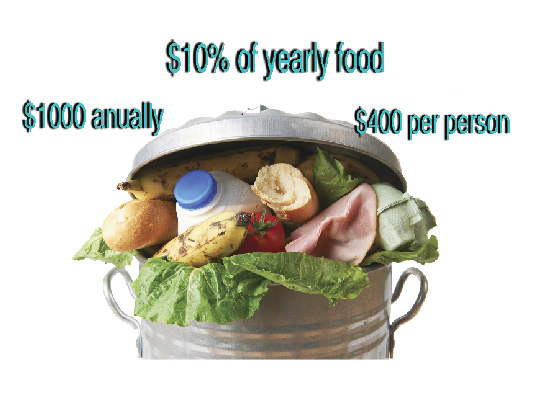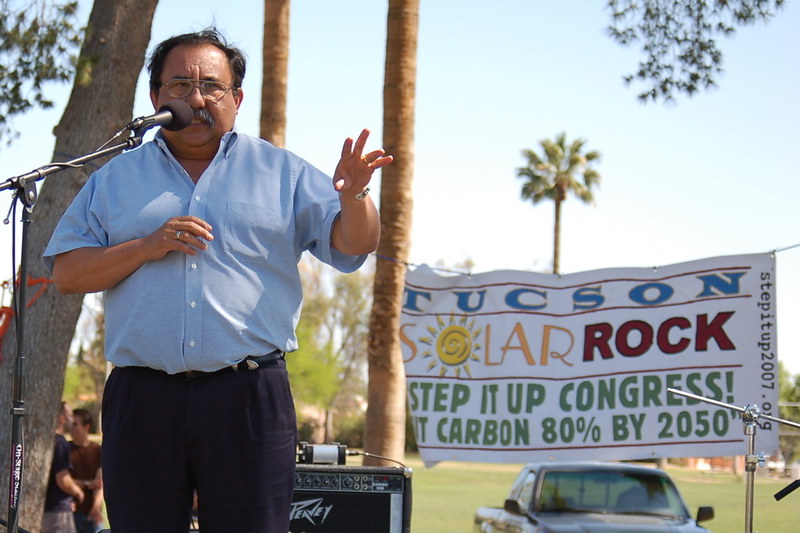A UA study gives consumers a new outlook on how to grocery shop like a sustainability professional and highlights the costly effects of throwing out uneaten foods.
Victoria Ligon, a UA graduate student with a master’s degree in retailing and consumer sciences, conducted a study focusing primarily on the effects of food waste and solutions on how to combat this problem.
Reports show that around 40 percent of the garbage in landfills is wasted food that was once edible. That food made it to the household trash bin completely uneaten. In Tucson, food waste makes up about 80 percent of the city’s landfill.
Additionally, the average American will toss about 10 percent of all food purchases to the landfill each year, which adds up to $400 per person, or around $1,000 annually, wasted on trashed food for a family of four.
In her study, Ligon investigated why and how these trends are so prevalent in American society.
“If we are throwing half of our food away, we have a lot of room to increase our efficiency before we even address the larger systemic problems in these systems,” Ligon said. “So that’s where I got interested originally.”
Ligon began her the project back in 2011 and finished in May 2015. She is currently working on publishing her study in a research journal.
By the end of her study, Ligon had found that the problem of household food waste mainly comes down to the way people buy food.
“Essentially, the patterns of how we shop are leading us to throw this food away,” she said. “Because when you look at the news, a lot of the attention that gets focused on in food waste tends be focused on things you can do in your kitchen … the fact of the matter is, we are overbuying.”
Ligon found that the tempting practice of hunting for bargains can be a big contributor to how much households waste. She said buying foods in bulk can be wasteful.
“We are overstocking our kitchens and at the end of the day, waste is inevitable,” Ligon said. “Of course, some of those techniques can reduce waste, but what they really do is prevent you from having to buy food in the future.”
In her research, Ligon found that perceptions of food in the American lifestyle led to this culture of overbuying.
“Most Americans shop at around four to seven different stores on a regular rotation. In my study, for instance, some people buy certain foods from Costco, particular items from Target and maybe they even have a specialty store like Trader Joe’s,” Ligon said. “People hate the experience … of coming home from the grocery store and realizing they forgot something.”
Ligon said this sort of behavior is not necessarily a conscious decision that consumers make. She gathered different opinions on food waste and found that most individuals carry a “natural aversion” to wasting food. She said she believes that wasteful behavior occurs because people don’t notice the decisions they make are harmful.
“In order to not confront that uncomfortable thing, we minimize, we justify, until over time, we have almost no sense of how much we are actually throwing away and what that value is,” Ligon said. “Where we have an intense acute sense as to where we got a deal.”
To combat the disposal of food, Ligon suggested shopping more frequently rather than buying all at once. She said if consumers keep in mind how much they need, food waste can be decreased.
Chet Phillips, the Associated Students of the University of Arizona program coordinator for the UA Compost Cats, further weighed in on food waste. Phillips said that food waste not only costs a lot for one’s wallet, but also poses a threat to the environment.
In regards to climate change, food waste is a contributor of green house gas emissions, according to the Environmental Protection Agency.
Phillips and a group of undergraduate students work to combat the problem by collecting trashed food and composting it for agricultural use.
“My students and I have had the opportunity to stand shin-deep in a field of tomatoes that arrived perfectly good for human consumption,” Phillips said. “If they hadn’t come to us, they would’ve gone straight to the landfill.”
While Compost Cats has recently made deals with markets across Tucson to gather unwanted food, Phillips said students can do their part by composting at home.
“There are accessible compost bins across campus, like at the Student Union [sic] and Pangea,” Phillips said. “As students use those things more, we can expand and add more compost bins on campus.”
Follow Lauren Renteria on Twitter.









